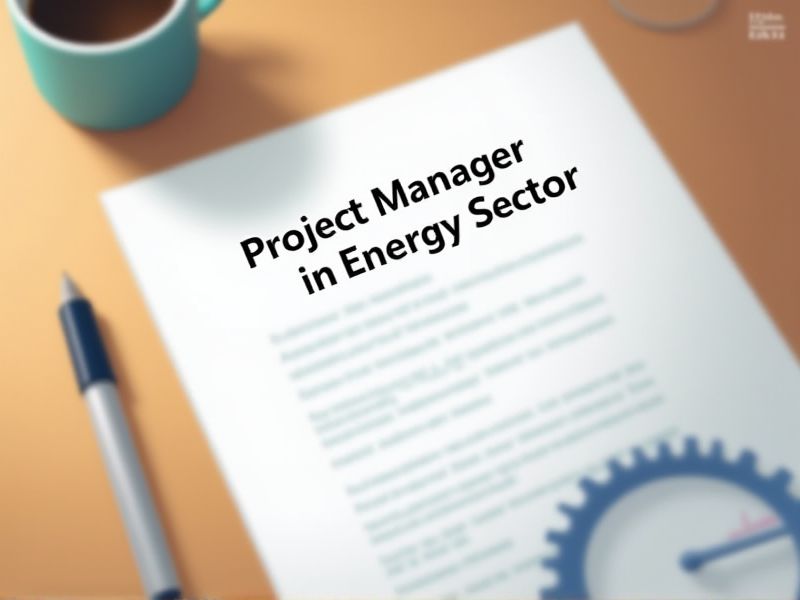
Project Managers in the energy sector often deal with complex projects that require specialized knowledge and skills. Certifications validate their expertise and demonstrate a commitment to maintaining up-to-date practices in a rapidly evolving industry. With regulatory requirements and sustainability goals becoming increasingly stringent, certified project managers ensure compliance and efficiency. Consider these certifications essential for a Project Manager role in the energy sector.
Project Management Professional (PMP)
The PMP certification equips project managers in the energy sector with standardized methodologies and best practices, enhancing project efficiency and effectiveness. The energy sector involves complex, large-scale projects where the PMP's structured approach minimizes risks and ensures project goals align with stakeholder expectations. Energy projects often involve cross-disciplinary teams and global partnerships; PMP training fosters better communication and collaboration across diverse groups. With a growing emphasis on sustainability and innovation, PMP-certified managers are better prepared to integrate new technologies and sustainable practices into energy projects, driving industry progress.
Certified Associate in Project Management (CAPM)
CAPM provides foundational knowledge of project management principles which is crucial for managing complex energy projects. Understanding standardized project management processes ensures energy projects are completed efficiently and within budget. The certification enhances credibility, increasing trust with stakeholders and potential clients within the energy sector. CAPM serves as a stepping stone for further professional development, paving the way for advanced roles and responsibilities in energy project management.
PMI Agile Certified Practitioner (PMI-ACP)
The PMI-ACP certification validates a project manager's expertise in agile practices, which is increasingly sought after in the energy sector due to the dynamic nature of energy projects. It enhances the ability to manage unpredictable project scopes and requirements, common in renewable energy and innovative technology initiatives. The certification fosters a culture of continuous improvement and customer collaboration, vital for adapting to regulatory shifts and market demands in energy. Agile practices reduce project risk and improve stakeholder engagement, which are critical factors for success in high-stakes energy projects.
Certified Energy Manager (CEM)
Having a Certified Energy Manager (CEM) enhances a project manager's understanding of energy efficiency methodologies, leading to more informed decision-making. The CEM certification equips managers with the skills to accurately evaluate energy systems, resulting in cost-effective and sustainable project outcomes. Knowledge from CEM training enables managers to identify and leverage energy-saving opportunities, driving both environmental benefits and project profitability. Additionally, project managers with CEM credentials gain credibility with stakeholders, fostering trust and confidence in their ability to manage energy-related aspects effectively.
Energy Risk Professional (ERP)
Project Managers in the energy sector often encounter complex risk landscapes that require specialized understanding, making the expertise of an Energy Risk Professional (ERP) essential. The integration of an ERP allows for the identification and mitigation of financial, operational, and regulatory risks specific to energy projects. With rising energy market volatility, having an ERP aids in strategic decision-making and ensures more stable project outcomes. The knowledge of an ERP in evaluating geopolitical influences and environmental regulations complements the project manager's ability to deliver projects within scope, time, and budget.
Certified Renewable Energy Professional (REP)
A Certified Renewable Energy Professional (REP) enhances a project manager's ability to oversee energy projects efficiently, as it provides specialized knowledge about renewable energy technologies. With a REP certification, a project manager is better equipped to identify sustainable energy solutions, which can lead to cost savings and compliance with environmental regulations. The energy sector's evolving dynamics make expertise in renewable energy crucial for competitive project execution. Hiring a project manager with REP credentials can enhance an organization's reputation, attracting stakeholders invested in sustainability.
Lean Six Sigma Black Belt Certification
Lean Six Sigma Black Belt Certification equips project managers with advanced process improvement techniques, essential for optimizing energy sector operations. The certification enhances a manager's ability to identify and eliminate inefficiencies, directly leading to cost savings and increased productivity. With its focus on data-driven decision making, it empowers leaders to tackle complex energy challenges and implement sustainable solutions. As energy projects often involve significant investment and risk, having certified expertise helps ensure projects meet deadlines and quality benchmarks.
Certified ScrumMaster (CSM)
The energy sector involves complex projects that benefit from efficient teamwork and adaptive processes. Acquiring a Certified ScrumMaster (CSM) designation equips a Project Manager with skills to implement agile methodologies, enhancing project flexibility. This leads to better handling of changes in energy regulations and technology advancements. Consequently, projects often see improved collaboration, faster delivery times, and optimized resource use.
ISO 50001 Energy Management Certification
ISO 50001 Energy Management Certification equips project managers with a structured framework for optimizing energy efficiency, directly reducing operational costs. The certification provides a standardized approach to energy management, which is critical given the energy sector's emphasis on sustainability and reducing carbon footprints. Possessing ISO 50001 certification enhances a project manager's credibility and ability to secure stakeholder trust by demonstrating commitment to best practices in energy performance. Knowledge of ISO standards ensures project managers stay informed about compliance requirements, minimizing risk of regulatory penalties.
Certified Facility Manager (CFM)
Certified Facility Manager (CFM) designation equips project managers in the energy sector with specialized skills for effective facility operations. This certification enhances their ability to manage energy infrastructure efficiently, reducing operational costs. Their expertise in compliance and safety standards minimizes risks and ensures regulatory adherence. Their strategic knowledge in sustainability aids in optimizing energy usage, fostering eco-friendly practices.
Summary
As you acquire certifications in the energy sector, your expertise and credibility in managing complex projects enhance significantly. This advancement tends to lead to higher project efficiency, reduced risks, and optimal resource management. Obtaining certifications often positions you for career advancement opportunities, increasing your potential salary and job prospects. Clients and stakeholders generally gain greater confidence in your leadership, promoting stronger professional relationships and project success.
